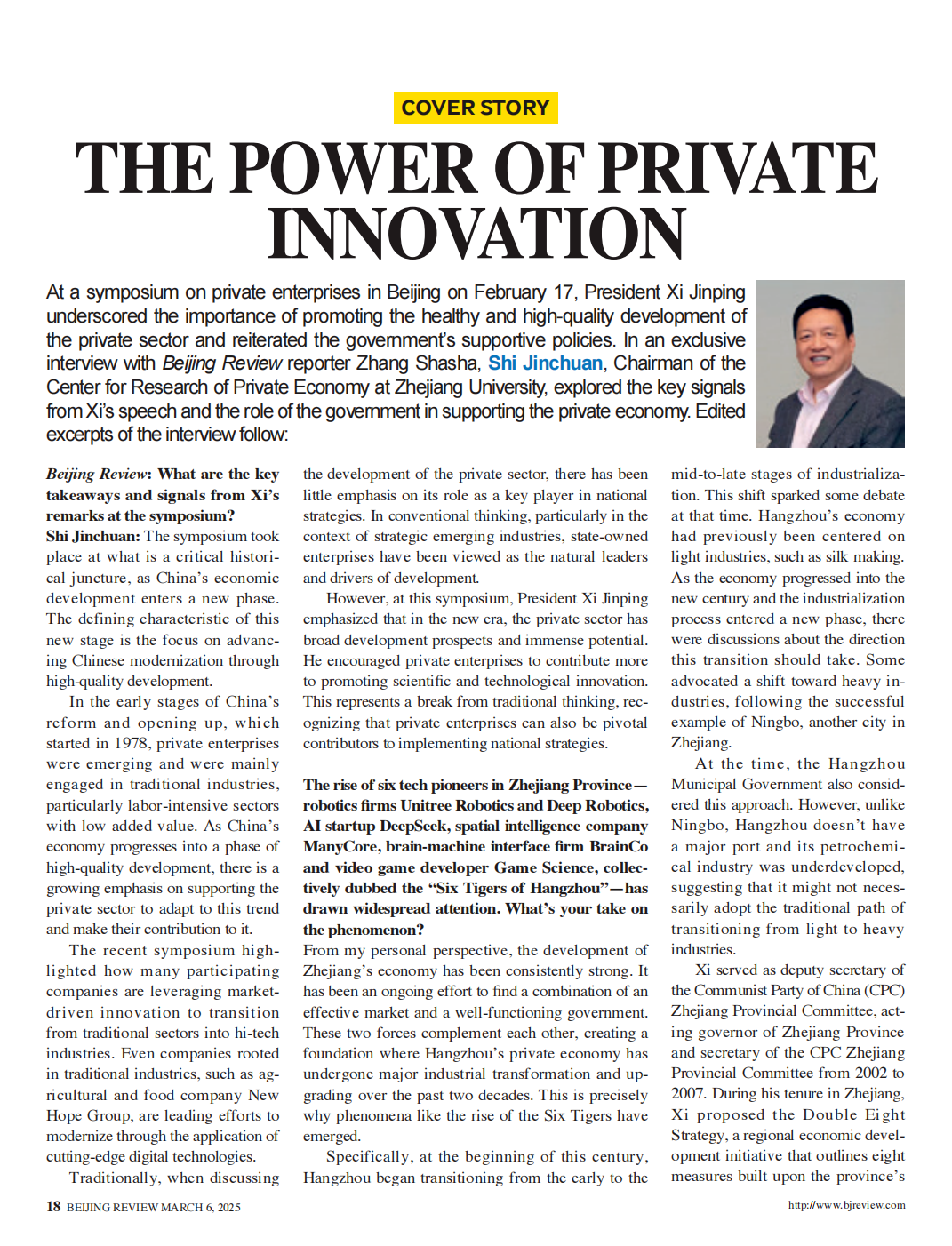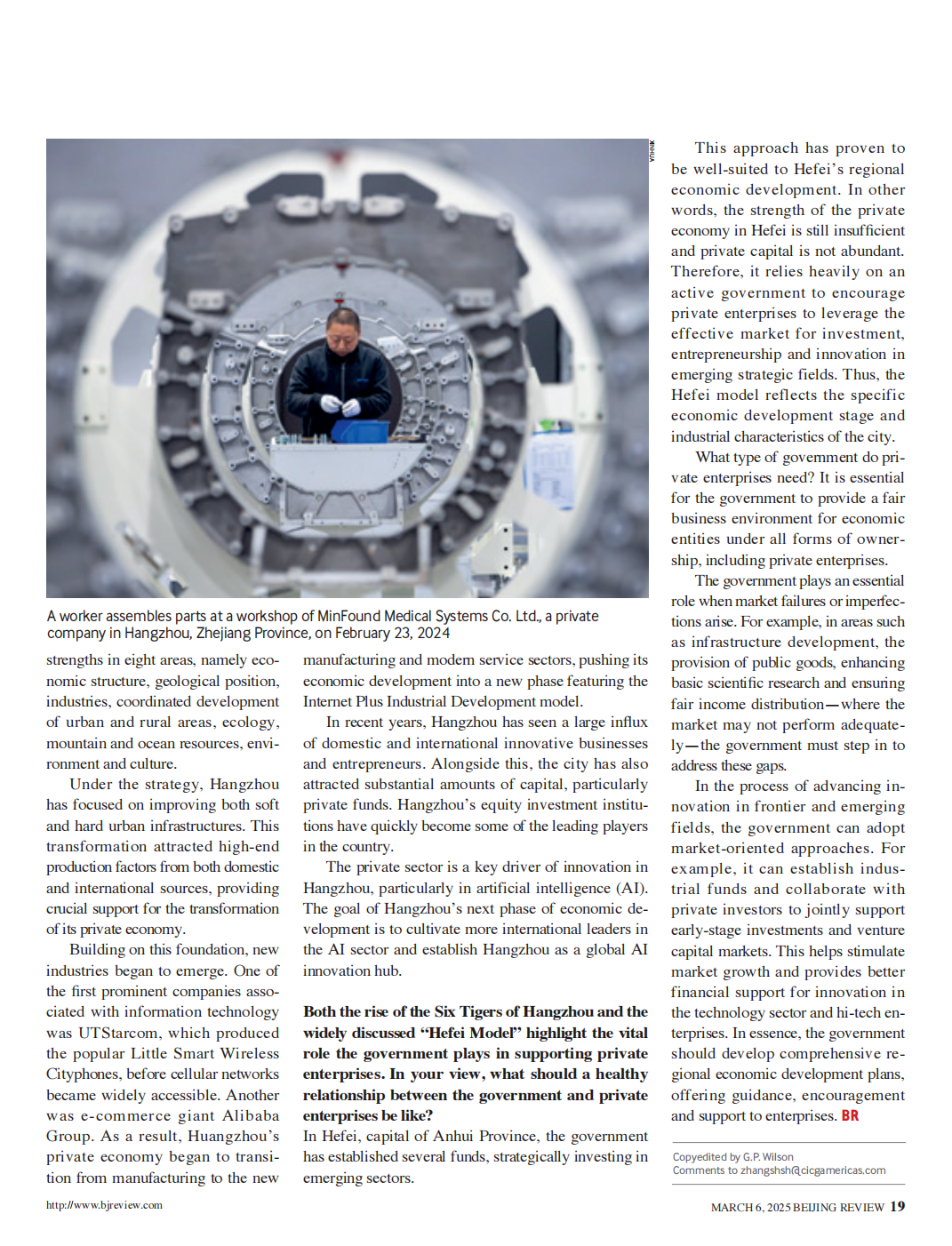近日,浙江大学文科资深教授史晋川接受了《北京周报》(BEIJING REVIEW)的专访《The power of private innovation》,就中国民营经济的发展、“杭州六小龙”现象以及创新驱动发展等议题发表了深刻见解。


《北京周报》作为中国唯一的国家级英文新闻周刊,此次专访全文已发布。转载如下。
At a symposium on private enterprises in Beijing on February 17, President Xi Jinping underscored the importance of promoting the healthy and high-quality development of the private sector and reiterated the government’s supportive policies. In an exclusive interview with Beijing Review reporter Zhang Shasha, Professor Shi Jinchuan, Chairman of the Center for Research of Private Economy at Zhejiang University, explored the key signals from Xi’s speech and the role of government in supporting the private economy. Edited excerpts of the interview follow:
Beijing Review: What are the key takeaways and signals from Xis remarks at the symposium?
Shi Jinchuan: The symposium took place at what is a critical historical juncture, as Chinas economic development enters a new phase. The defining characteristic of this new stage is the focus on advancing Chinese modernization through high-quality development.
In the early stages of Chinas reform and opening up, which started in 1978, private enterprises were emerging and were mainly engaged in traditional industries, particularly labor-intensive sectors with low added value. As Chinas economy progresses into a phase of high-quality development, there is a growing emphasis on supporting the private sector to adapt to this trend and make their contribution to it.
The recent symposium highlighted how many participating companies are leveraging market-driven innovation to transition from traditional sectors into hi-tech industries. Even companies rooted in traditional industries, such as agricultural and food company New Hope Group, are leading efforts to modernize through the application of cutting-edge digital technologies.
Traditionally, when discussing the development of the private sector, there has been little emphasis on its role as a key player in national strategies. In conventional thinking, particularly in the context of strategic emerging industries, state-owned enterprises have been viewed as the natural leaders and drivers of development.
However, at this symposium, President Xi Jinping emphasized that in the new era, the private sector has broad development prospects and immense potential. He encouraged private enterprises to contribute more to promoting scientific and technological innovation. This represents a break from traditional thinking, recognizing that private enterprises can also be pivotal contributors to implementing national strategies.
The rise of six tech pioneers in Zhejiang Province—robotics firms Unitree Robotics and Deep Robotics, AI startup DeepSeek, spatial intelligence company ManyCore, brain-machine interface firm BrainCo and video game developer Game Science, collectively dubbed the "Six Tigers of Hangzhou"—has drawn widespread attention. Whats your take on the phenomenon?
From my personal perspective, the development of Zhejiangs economy has been consistently strong. It has been an ongoing effort to find a combination of an effective market and a well-functioning government. These two forces complement each other, creating a foundation where Hangzhous private economy has undergone major industrial transformation and upgrading over the past two decades. This is precisely why phenomena like the rise of the Six Tigers have emerged.
Specifically, at the beginning of this century, Hangzhou began transitioning from the early to the mid-to-late stages of industrialization. This shift sparked some debate at that time. Hangzhous economy had previously been centered on light industries, such as silk making. As the economy progressed into the new century and the industrialization process entered a new phase, there were discussions about the direction this transition should take. Some advocated a shift toward heavy industries, following the successful example of Ningbo, another city in Zhejiang.
At the time, the Hangzhou Municipal Government also considered this approach. However, unlike Ningbo, Hangzhou doesnt have a major port and its petrochemical industry was underdeveloped, suggesting that it might not necessarily adopt the traditional path of transitioning from light to heavy industries.
Xi served as deputy secretary of the Communist Party of China (CPC) Zhejiang Provincial Committee, acting governor of Zhejiang Province and secretary of the CPC Zhejiang Provincial Committee from 2002 to 2007. During his tenure in Zhejiang, Xi proposed the Double Eight Strategy, a regional economic development initiative that outlines eight measures built upon the provinces strengths in eight areas, namely economic structure, geological position, industries, coordinated development of urban and rural areas, ecology, mountain and ocean resources, environment and culture.
Under the strategy, Hangzhou has focused on improving both soft and hard urban infrastructures. This transformation attracted high-end production factors from both domestic and international sources, providing crucial support for the transformation of its private economy.
Building on this foundation, new industries began to emerge. One of the first prominent companies associated with information technology was UTStarcom, which produced the popular Little Smart Wireless Cityphones, before cellular networks became widely accessible. Another was e-commerce giant Alibaba Group. As a result, Huangzhous private economy began to transition from manufacturing to the new manufacturing and modern service sectors, pushing its economic development into a new phase featuring the Internet Plus Industrial Development model.
In recent years, Hangzhou has seen a large influx of domestic and international innovative businesses and entrepreneurs. Alongside this, the city has also attracted substantial amounts of capital, particularly private funds. Hangzhous equity investment institutions have quickly become some of the leading players in the country.
The private sector is a key driver of innovation in Hangzhou, particularly in artificial intelligence (AI). The goal of Hangzhous next phase of economic development is to cultivate more international leaders in the AI sector and establish Hangzhou as a global AI innovation hub.
图片
A worker assembles parts at a workshop of MinFound Medical Systems Co. Ltd., a private company in Hangzhou, Zhejiang Province, on February 23, 2024 (XINHUA)
Both the rise of the Six Tigers of Hangzhou and the widely discussed "Hefei Model" highlight the vital role the government plays in supporting private enterprises. In your view, what should a healthy relationship between the government and private enterprises be like?
In Hefei, capital of Anhui Province, the government has established several funds, strategically investing in emerging sectors.
This approach has proven to be well-suited to Hefeis regional economic development. In other words, the strength of the private economy in Hefei is still insufficient and private capital is not abundant. Therefore, it relies heavily on an active government to encourage private enterprises to leverage the effective market for investment, entrepreneurship and innovation in emerging strategic fields. Thus, the Hefei model reflects the specific economic development stage and industrial characteristics of the city.
What type of government do private enterprises need? It is essential for the government to provide a fair business environment for economic entities under all forms of ownership, including private enterprises.
The government plays an essential role when market failures or imperfections arise. For example, in areas such as infrastructure development, the provision of public goods, enhancing basic scientific research and ensuring fair income distribution—where the market may not perform adequately—the government must step in to address these gaps.
In the process of advancing innovation in frontier and emerging fields, the government can adopt market-oriented approaches. For example, it can establish industrial funds and collaborate with private investors to jointly support early-stage investments and venture capital markets. This helps stimulate market growth and provides better financial support for innovation in the technology sector and hi-tech enterprises. In essence, the government should develop comprehensive regional economic development plans, offering guidance, encouragement and support to enterprises.
Copyedited by G.P. Wilson
来源:浙江大学经济学院

